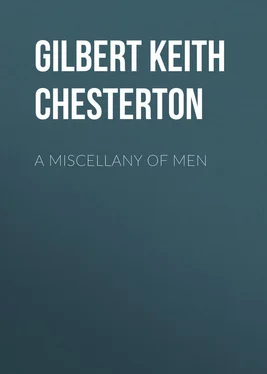Gilbert Chesterton - A Miscellany of Men
Здесь есть возможность читать онлайн «Gilbert Chesterton - A Miscellany of Men» — ознакомительный отрывок электронной книги совершенно бесплатно, а после прочтения отрывка купить полную версию. В некоторых случаях можно слушать аудио, скачать через торрент в формате fb2 и присутствует краткое содержание. Жанр: foreign_antique, foreign_prose, на английском языке. Описание произведения, (предисловие) а так же отзывы посетителей доступны на портале библиотеки ЛибКат.
- Название:A Miscellany of Men
- Автор:
- Жанр:
- Год:неизвестен
- ISBN:нет данных
- Рейтинг книги:4 / 5. Голосов: 1
-
Избранное:Добавить в избранное
- Отзывы:
-
Ваша оценка:
- 80
- 1
- 2
- 3
- 4
- 5
A Miscellany of Men: краткое содержание, описание и аннотация
Предлагаем к чтению аннотацию, описание, краткое содержание или предисловие (зависит от того, что написал сам автор книги «A Miscellany of Men»). Если вы не нашли необходимую информацию о книге — напишите в комментариях, мы постараемся отыскать её.
A Miscellany of Men — читать онлайн ознакомительный отрывок
Ниже представлен текст книги, разбитый по страницам. Система сохранения места последней прочитанной страницы, позволяет с удобством читать онлайн бесплатно книгу «A Miscellany of Men», без необходимости каждый раз заново искать на чём Вы остановились. Поставьте закладку, и сможете в любой момент перейти на страницу, на которой закончили чтение.
Интервал:
Закладка:
Nearly all the great newspapers, both pompous and frivolous, will declare dogmatically day after day, until every one half believes it, that red and green are the only two colours in the paint-box. THE OBSERVER will say: “No one who knows the solid framework of politics or the emphatic first principles of an Imperial people can suppose for a moment that there is any possible compromise to be made in such a matter; we must either fulfil our manifest racial destiny and crown the edifice of ages with the august figure of a Green Premier, or we must abandon our heritage, break our promise to the Empire, fling ourselves into final anarchy, and allow the flaming and demoniac image of a Red Premier to hover over our dissolution and our doom.” The DAILY MAIL would say: “There is no halfway house in this matter; it must be green or red. We wish to see every honest Englishman one colour or the other.” And then some funny man in the popular Press would star the sentence with a pun, and say that the DAILY MAIL liked its readers to be green and its paper to be read. But no one would even dare to whisper that there is such a thing as yellow.
For the purposes of pure logic it is clearer to argue with silly examples than with sensible ones: because silly examples are simple. But I could give many grave and concrete cases of the kind of thing to which I refer. In the later part of the Boer War both parties perpetually insisted in every speech and pamphlet that annexation was inevitable and that it was only a question whether Liberals or Tories should do it. It was not inevitable in the least; it would have been perfectly easy to make peace with the Boers as Christian nations commonly make peace with their conquered enemies. Personally I think that it would have been better for us in the most selfish sense, better for our pocket and prestige, if we had never effected the annexation at all; but that is a matter of opinion. What is plain is that it was not inevitable; it was not, as was said, the only possible course; there were plenty of other courses; there were plenty of other colours in the box. Again, in the discussion about Socialism, it is repeatedly rubbed into the public mind that we must choose between Socialism and some horrible thing that they call Individualism. I don’t know what it means, but it seems to mean that anybody who happens to pull out a plum is to adopt the moral philosophy of the young Horner – and say what a good boy he is for helping himself.
It is calmly assumed that the only two possible types of society are a Collectivist type of society and the present society that exists at this moment and is rather like an animated muck-heap. It is quite unnecessary to say that I should prefer Socialism to the present state of things. I should prefer anarchism to the present state of things. But it is simply not the fact that Collectivism is the only other scheme for a more equal order. A Collectivist has a perfect right to think it the only sound scheme; but it is not the only plausible or possible scheme. We might have peasant proprietorship; we might have the compromise of Henry George; we might have a number of tiny communes; we might have co-operation; we might have Anarchist Communism; we might have a hundred things. I am not saying that any of these are right, though I cannot imagine that any of them could be worse than the present social madhouse, with its top-heavy rich and its tortured poor; but I say that it is an evidence of the stiff and narrow alternative offered to the civic mind, that the civic mind is not, generally speaking, conscious of these other possibilities. The civic mind is not free or alert enough to feel how much it has the world before it. There are at least ten solutions of the Education question, and no one knows which Englishmen really want. For Englishmen are only allowed to vote about the two which are at that moment offered by the Premier and the Leader of the Opposition. There are ten solutions of the drink question; and no one knows which the democracy wants; for the democracy is only allowed to fight about one Licensing Bill at a time.
So that the situation comes to this: The democracy has a right to answer questions, but it has no right to ask them. It is still the political aristocracy that asks the questions. And we shall not be unreasonably cynical if we suppose that the political aristocracy will always be rather careful what questions it asks. And if the dangerous comfort and self-flattery of modern England continues much longer there will be less democratic value in an English election than in a Roman saturnalia of slaves. For the powerful class will choose two courses of action, both of them safe for itself, and then give the democracy the gratification of taking one course or the other. The lord will take two things so much alike that he would not mind choosing from them blindfold – and then for a great jest he will allow the slaves to choose.
THE MAD OFFICIAL
Going mad is the slowest and dullest business in the world. I have very nearly done it more than once in my boyhood, and so have nearly all my friends, born under the general doom of mortals, but especially of moderns; I mean the doom that makes a man come almost to the end of thinking before he comes to the first chance of living.
But the process of going mad is dull, for the simple reason that a man does not know that it is going on. Routine and literalism and a certain dry-throated earnestness and mental thirst, these are the very atmosphere of morbidity. If once the man could become conscious of his madness, he would cease to be man. He studies certain texts in Daniel or cryptograms in Shakespeare through monstrously magnifying spectacles, which are on his nose night and day. If once he could take off the spectacles he would smash them. He deduces all his fantasies about the Sixth Seal or the Anglo-Saxon Race from one unexamined and invisible first principle. If he could once see the first principle, he would see that it is not there.
This slow and awful self-hypnotism of error is a process that can occur not only with individuals, but also with whole societies. It is hard to pick out and prove; that is why it is hard to cure. But this mental degeneration may be brought to one test, which I truly believe to be a real test. A nation is not going mad when it does extravagant things, so long as it does them in an extravagant spirit. Crusaders not cutting their beards till they found Jerusalem, Jacobins calling each other Harmodius and Epaminondas when their names were Jacques and Jules, these are wild things, but they were done in wild spirits at a wild moment.
But whenever we see things done wildly, but taken tamely, then the State is growing insane. For instance, I have a gun license. For all I know, this would logically allow me to fire off fifty-nine enormous field-guns day and night in my back garden. I should not be surprised at a man doing it; for it would be great fun. But I should be surprised at the neighbours putting up with it, and regarding it as an ordinary thing merely because it might happen to fulfill the letter of my license.
Or, again, I have a dog license; and I may have the right (for all I know) to turn ten thousand wild dogs loose in Buckinghamshire. I should not be surprised if the law were like that; because in modern England there is practically no law to be surprised at. I should not be surprised even at the man who did it; for a certain kind of man, if he lived long under the English landlord system, might do anything. But I should be surprised at the people who consented to stand it. I should, in other words, think the world a little mad if the incident, were received in silence.
Now things every bit as wild as this are being received in silence every day. All strokes slip on the smoothness of a polished wall. All blows fall soundless on the softness of a padded cell. For madness is a passive as well as an active state: it is a paralysis, a refusal of the nerves to respond to the normal stimuli, as well as an unnatural stimulation. There are commonwealths, plainly to be distinguished here and there in history, which pass from prosperity to squalor, or from glory to insignificance, or from freedom to slavery, not only in silence, but with serenity. The face still smiles while the limbs, literally and loathsomely, are dropping from the body. These are peoples that have lost the power of astonishment at their own actions. When they give birth to a fantastic fashion or a foolish law, they do not start or stare at the monster they have brought forth. They have grown used to their own unreason; chaos is their cosmos; and the whirlwind is the breath of their nostrils. These nations are really in danger of going off their heads en masse; of becoming one vast vision of imbecility, with toppling cities and crazy country-sides, all dotted with industrious lunatics. One of these countries is modern England.
Читать дальшеИнтервал:
Закладка:
Похожие книги на «A Miscellany of Men»
Представляем Вашему вниманию похожие книги на «A Miscellany of Men» списком для выбора. Мы отобрали схожую по названию и смыслу литературу в надежде предоставить читателям больше вариантов отыскать новые, интересные, ещё непрочитанные произведения.
Обсуждение, отзывы о книге «A Miscellany of Men» и просто собственные мнения читателей. Оставьте ваши комментарии, напишите, что Вы думаете о произведении, его смысле или главных героях. Укажите что конкретно понравилось, а что нет, и почему Вы так считаете.








